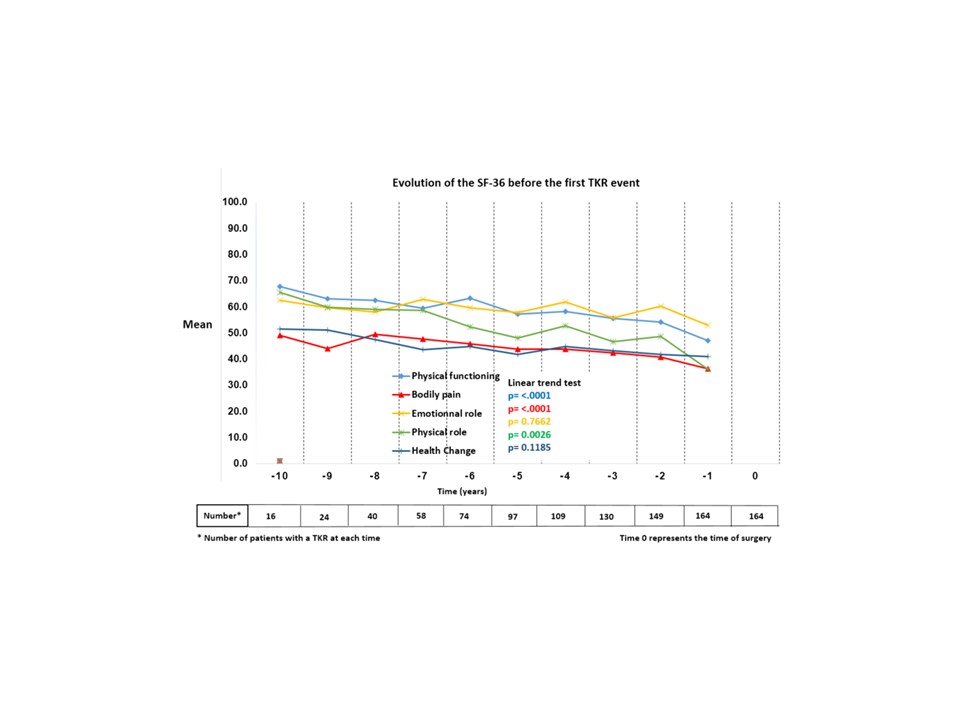Session Information
Session Type: Poster Session A
Session Time: 10:30AM-12:30PM
Background/Purpose: Few studies have examined how the quality of life (QoL) evolves in patients with osteoarthritis (OA) before undergoing total hip or total knee replacement surgery (THR/TKR). Although quality of life (QoL) appears to be stable in OA cohorts, patients undergo THR or TKR. This raises the question of whether it is deterioration in QoL that motivates intervention, and which specific dimensions deteriorate and lead to intervention.The aim of the study was to analyze changes in various dimensions of QoL (especially pain, functional capacity, mental status, and social functioning) prior to THR/TKR in patients with symptomatic hip and/or knee OA.
Methods: The Knee and Hip OsteoArthritis Long-term Assessment (KHOALA) cohort is a French multicenter, population-based cohort of 878 patients with symptomatic hip or knee OA. Patients were followed annually for up to 10 years using self-administered questionnaires. QOL was assessed using the SF36. The evolution of QoL before the first THR/TKR is described by the mean (standard deviation) up to 10 years before surgery.
Results: Of the 878 patients in the cohort, 164 (18.7%) underwent TKR and 111 (12.6%) underwent THR over the 10-year follow-up: 196 (71.3%) were female, mean (SD) age 62.8 (7.5) years, mean body mass index 29.8 (6.0). 83 patients had more than one THR or TKR during follow-up.The evolution of SF-36 before the first incident THR and TKR are shown in the 2 graphs (Figure). Prior to TKR for knee OA, deterioration in QoL was statistically significant over the entire period for physical function, bodily pain and physical role. Prior to THR for hip OA, deterioration in QoL was statistically significant over the entire period for physical function, bodily pain, physical role, and also emotional role and health change.Changes in QoL differ from one dimension to another: rather stable trajectories until accelerated deterioration in QoL for physical function, physical pain and physical role dimensions, 2 years before TKR. Slow deterioration in the different dimensions of QoL before THR, with a sharp acceleration in the deterioration of QoL two years before surgery for the dimensions of physical function, bodily pain, physical role, emotional role, and change in health. Deterioration was greater for physical function and physical role than for pain.Mental health, vitality, and social functioning were not found to change over time.
Conclusion: In the KHOALA cohort, impairment of physical function, pain, and physical or emotional role were well observed prior to surgery.For hip OA, these impairments occurred progressively during several years with a sharp acceleration 2 years prior to surgery in particular for physical functional and role dimensions. For knee OA, trajectories are pretty stable up to 2 years prior to surgery.Deterioration in QoL appears to be more gradual for THR than TKR and greater in the two years prior to surgery, particularly for functional abilities dimensions.
To cite this abstract in AMA style:
Rat A, Augustin L, Wieczorek M, sellam J, Ngueyon Sime w, Pouchot J, Roux C, SARAUX A, Guillemin F, Coste J. What changes in quality of life can be observed in patients with knee or hip OA prior to total hip or total knee replacement surgery ? data from the KHOALA cohort [abstract]. Arthritis Rheumatol. 2025; 77 (suppl 9). https://acrabstracts.org/abstract/what-changes-in-quality-of-life-can-be-observed-in-patients-with-knee-or-hip-oa-prior-to-total-hip-or-total-knee-replacement-surgery-data-from-the-khoala-cohort/. Accessed .« Back to ACR Convergence 2025
ACR Meeting Abstracts - https://acrabstracts.org/abstract/what-changes-in-quality-of-life-can-be-observed-in-patients-with-knee-or-hip-oa-prior-to-total-hip-or-total-knee-replacement-surgery-data-from-the-khoala-cohort/


.jpg)